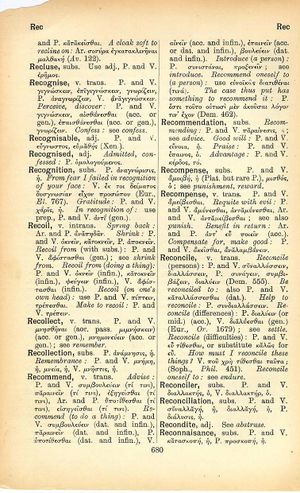recompense: Difference between revisions
From LSJ
οὐ κύριος ὑπὲρ μέδιμνόν ἐστ' ἀνὴρ οὐδεὶς ἔτι → he is no better than a woman, no man is any longer permitted to transact business over the one-bushel limit?
(Woodhouse 4) |
(CSV4) |
||
| Line 1: | Line 1: | ||
{{ | {{Woodhouse1 | ||
| | |Text=[[File:woodhouse_680.jpg|thumb|link={{filepath:woodhouse_680.jpg}}]]'''subs.''' | ||
P. and V. [[ἀμοιβή]], ἡ (Plat. but rare P.), [[μισθός]], ὁ; see [[punishment]], [[reward]]. | |||
'''v. trans.''' | |||
P. and V. ἀμείβεσθαι. | |||
<b class="b2">Requite with evil</b>: P. and V. ἀμύνεσθαι, ἀνταμύνεσθαι, Ar. and V. ἀνταμείβεσθαι; see also [[punish]]. | |||
<b class="b2">Benefit in return</b>: Ar. and P. ἀντʼ [[εὖ]] ποιεῖν (acc.). | |||
<b class="b2">Compensate for, make good</b>: P. and V. ἀκεῖσθαι, ἀναλαμβάνειν. | |||
}} | }} | ||
Revision as of 09:50, 21 July 2017
English > Greek (Woodhouse)
subs.
P. and V. ἀμοιβή, ἡ (Plat. but rare P.), μισθός, ὁ; see punishment, reward. v. trans. P. and V. ἀμείβεσθαι. Requite with evil: P. and V. ἀμύνεσθαι, ἀνταμύνεσθαι, Ar. and V. ἀνταμείβεσθαι; see also punish. Benefit in return: Ar. and P. ἀντʼ εὖ ποιεῖν (acc.). Compensate for, make good: P. and V. ἀκεῖσθαι, ἀναλαμβάνειν.

